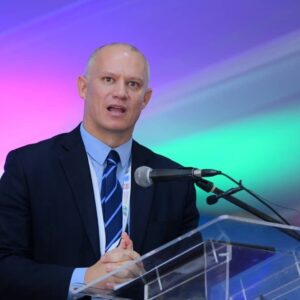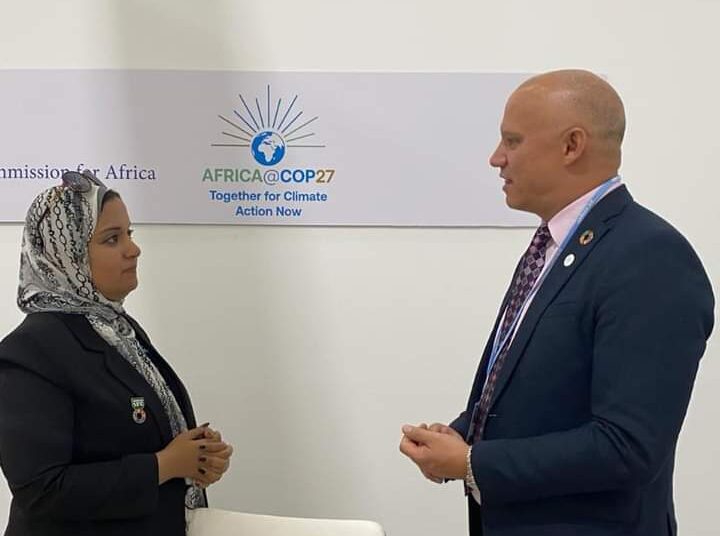Moving from pledges to implementation requires sufficient and efficient finance. That is why a group of high-level experts prepared an important report dealing with the issue of climate finance. The report is commissioned by the Egyptian and British presidencies of the COP27 and COP26 climate conferences.
The Egyptian Mail sat with Jean-Paul Adam, Director for Technology, Climate Change and Natural Resources Management, United Nations Economic Commission for Africa (UNECA), who has participated in preparing this report.
According to Adam, there should be a recognition by the developed countries that they have to meet the pledges they have already made.
“It’s very obvious. Secondly, there has to be an increase in finance through the international development institutions.”
Thirdly, he continued, multilateral development banks have to give more money.
As for the report, UNECA official said that the report on climate finance shows that these banks need at least three times more money.
“I think Egypt has done very well in really focusing attention on some of the other areas that can allow us to raise additional finance. So for example, the use of debt-swaps for investment in nature where existing debt would be refinanced is of paramount importance,” he noted.

There are also attempts to create fiscal space to invest in climate action. The UNECA official also highlighted the importance of other initiatives like using more blended finance to issue for example, green bonds, sustainability-linked bonds, to be able to finance sustainable development and climate change.
“We have also seen a big emergence of the opportunity for the development of carbon credit markets.”
The report shows very clearly, there is a need for about $1 trillion extra a year for investments aligned with the climate based on Paris Agreement. “One trillion US dollars per year. This is for developing countries, excluding China.”
It is not an impossible amount as there was over 17 trillion dollars mobilised to fight Covid-19, he added.
Adam explained that not all this finance is in the form of grants. Rather, portions of it can be concessional finance. “There is also need to support countries to mobilise their own resources. This is where carbon credit markets and the private sector can play a bigger role,” he noted.
UNECA official pointed out that private sector can be supported through blended finance and reducing the risks associated with investing in regions such as Africa, especially because now Africa has only 14 per cent of its total investment in climate comes from the private sector.
“And this is three times less than, for example, South Asia, which is the next region with the least private sector investment. So Africa has a lot to do to get more private sector investment.”
The report has very much looked at what is feasible based on the current circumstances, bearing in mind that this finance should be targeted.
“Obviously, around the world we are fighting inflation. So the investment has to be very targeted. In Africa, the focus must be around energy.”
According to Adam, investing in renewable and clean energy will allow a multiplier effect for other sectors. It will allow more sustainable development to occur, he added.
These are the immediate aspects. In the medium term, there is focus on the development of domestic resources for development. “There are other forms of reforms that can be addressed such as also reducing the illicit financial flows.”
Adam, meanwhile, pointed out that there has been a very strong engagement by COP28 presidency. “There is a number of initiatives which Egypt has, I would say promoted, particularly on finance Day, which we expect to be continued in COP28.”
“There will be a lot of work on using key performance indicators that are linked directly to climate as well as the insertion of what we call climate clauses.”
Adam added that COP27 is happening in very difficult conditions. Maybe there is no COP that has been held in such a difficult global environment. We have come out of a pandemic, which has created a huge resource gap. This has been followed by an energy and food crisis. The developed countries that have made commitments are also adopting a fiscal tightening scenario, and there is no money coming to the table. So this is where I think we have to make the best use of a very difficult situation. And we have to make sure that the COP can create momentum.
Maybe financing doesn’t flow from day one, but it is very clear where the financing will come from.
“I think the report helps to do that because it shows a credible way how countries could use investments through multilateral development banks to create new money that can be invested in vital sectors. This is something that can be done immediately.”
Adam stressed that UNECA has been supporting Africa because they made very clear the positions, namely the promises that have been made must be delivered. “There is a commitment on loss and damage. This is a part of the Paris agreement that cannot be delayed. And there are climate emergencies. African countries in some cases, according to our studies, spend up to 90 per cent of their budgets fighting climate emergency, floods and droughts. African countries are losing money every day because of climate change.”
The official said there was a real risk that loss and damage will not even be on the COP agenda. “The good news is that the file is on the agenda. The bad news, there is no commitment or meaningful commitment yet regarding financing.”
One of the very interesting announcements was the launch of a sustainable debt coalition and bringing countries together to focus on ways to ensure that debt is linked to climate change.
“So any debt that is issued must have clauses that in the event of a climate emergency, that debt is put on hold,” he explained.
As for the African carbon markets initiative, Adam said it is designed to help bring investors to recognise the huge potential that Africa has and allow that money to flow precisely to projects that have a real impact on communities.
“The carbon credits must be generated by activities that are creating jobs for people in communities. So for example, it can be an investment in renewable energy. In our community, it can be investment in sustainable farming practices. The Economic Commission for Africa has been supporting the countries of Congo Basin, which includes Gabon, and we have helped them to create a regional registry for carbon credits.”
Commenting on the ongoing negotiations, Adam stressed that the Commission’s priorities are also the African negotiators’ priority. “So, we start by always emphasising that Paris agreement has to be implemented. We always start with those aspects. But these aspects are known. The capacity is there. We do not need to analyze it. It’s more an advocacy.”
It is worth noting that in 2022 alone, African countries will pay back in bilateral debt, two times more than a receiving aid. Also, there are 23 African countries that are in high risk of debt stress.
As for the outcomes of COP27, Adam thinks it will be very difficult to get good announcements.
“The countries that should finance are scared to announce you money because of things that are happening. But they have a responsibility to do so.”
But on the more optimistic side, Adam thinks that Egyptian presidency has at least created a framework where hopefully announcements can come even if they don’t come immediately. “But we have the framework for new finance to flow. This can happen by financial innovations.”
The role of philanthropists has also been highlighted in COP27. “COP27 has been a very good space for us to see the contribution of philanthropy. There has been a lot of commitments from philanthropic Organisations .”
Civil society , he continued, has also a key role to play because they also can ensure that resources are flowing to people who need it the most.
And they are a key part of preventing green washing, monitoring the process through which commitments are being implemented.






Discussion about this post